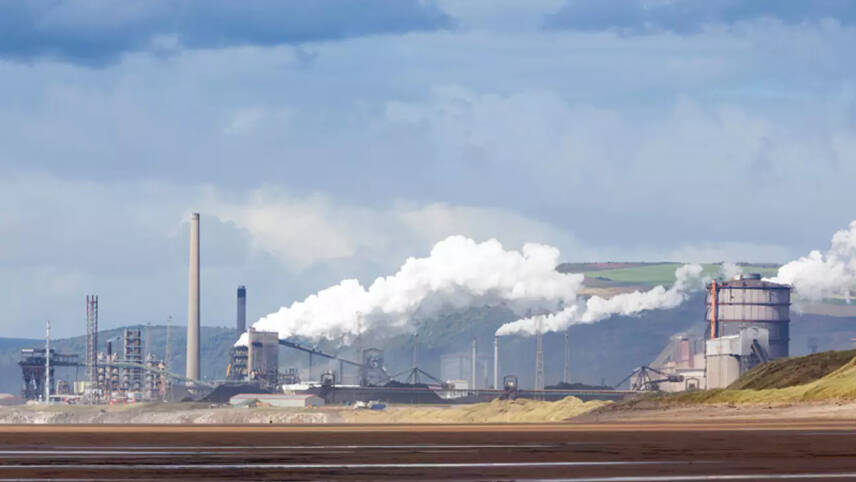Register for free and continue reading
Join our growing army of changemakers and get unlimited access to our premium content

Pictured: Port Talbot steel works, Wales
Port Talbot is the UK’s largest steelworks and the £500m Government support package will see steel production continue while emissions are reduced.
Tata Steel and the UK Government confirmed a joint agreement on a proposal to invest in state-of-the-art electric arc furnace steelmaking at the Port Talbot site, costing a total of £1.25bn.
The company claims the project will bolster the steel sector and will reduce direct emissions by 50 million tonnes over a decade. The Government adds that it will reduce the UK’s entire business and industry carbon emissions by 7%, Wales’s overall emissions by 22% and the Port Talbot site’s emissions by 85%.
Around 2% of the UK’s total emissions or 14% of its industrial emissions are attributable to iron and steel production.
Business and Trade Secretary Kemi Badenoch said: “The UK Government is backing our steel sector, and this proposal will secure a sustainable future for Welsh steel and is expected to save thousands of jobs in the long term.
“This is a historic package of support from the UK Government and will not only protect skilled jobs in Wales but also grow the UK economy, boost growth and help ensure a successful UK steel industry.”
Job loss concerns
Reports of Government financial support for Tata Steel have been rumbling on all year. In January 2023, the BBC reported that both Tata and British Steel were close to agreeing Government funding packages primarily be intended to avert job losses through facility closures or downsizing, but that they would come with green ‘strings’.
Today’s package, which is substantially more than what was reported at the start of the year will, according to the Government, protect thousands of jobs across the UK steel supply chain.
However, reports suggest that switching to a less labour-intensive production process will see as many as 3,000 workers lose jobs across the UK.
Tata Steel will soon commence a consultation on the proposal and how to switch to low-carbon production methods.
The Group’s chairman N Chandrasekaran said: “The agreement with the UK Government is a defining moment for the future of the steel industry and indeed the industrial value chain in the UK. It has been an absolute pleasure to work with the His Majesty’s Government and the Prime Minister Rt Hon Rishi Sunak in developing the proposed transition pathway for the future of sustainable steelmaking in the UK.
“The proposed investment will preserve significant employment and presents a great opportunity for the development of a green technology-based industrial ecosystem in South Wales. We look forward to working with our stakeholders on these proposals in a responsible manner.”
The company has also announced a £20m investment package over the next four years to set up two additional Centres of Innovation and Technology in the UK at the Henry Royce Institute at Manchester (for advanced materials research) and at Imperial College London (for research in sustainable design and manufacturing).
Tata Steel is part of the Green Hydrogen Alliance (GHA), launched earlier this year to help ensure the UK remains competitive globally in the development of low-carbon hydrogen.
Industry reaction
TUC General Secretary Paul Nowak said: “This is a devastating blow for workers at Port Talbot and the opposite of a Just Transition. Ministers must press pause and urgently get around the table with unions. It beggars belief that they have been locked out of talks.
“Instead of safeguarding livelihoods in the steel industry, this deal will see thousands of good, unionised jobs potentially lost forever. An electric arc furnace-only model for Port Talbot is simply the wrong approach for making our steel greener.
“We need a proper long-term plan for zero-carbon steel-making in this country – not 1980s-style deindustrialisation. Tackling climate change can go hand in hand with creating and protecting good jobs. The Conservatives are presenting a false choice.”
Dr Simon Cran-McGreehin, Head of Analysis at the Energy and Climate Intelligence Unit (ECIU) said: “The Government may be trying to do the right thing here, but if this deal leads to 3,000 job loses it can’t be right. Having a long-term vision that leads to hydrogen-based steel manufacture at Port Talbot, as well as the arc furnaces that recycle used steel, could protect many more jobs.
“The UK steel industry can’t stand still with demand for cleaner steel growing and Europe already stealing a march with new technologies. Stasis is a recipe for decline, but the deals done have to be right and have to be future proof.”


Please login or Register to leave a comment.